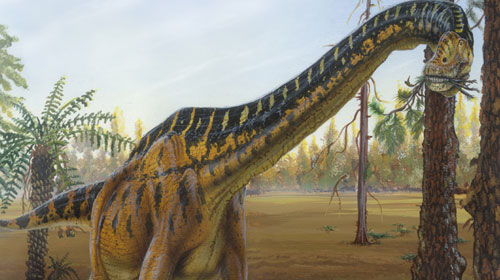(单词翻译:单击)
When growing is your best defense, gaining weight is serious business.
当成长成为了最佳防守之道,增加体重就是重中之重。
So Sauroposeidon does away with time-consuming tasks like chewing.
所以波塞东龙略去了耗时的任务比如咀嚼。
If you could just swallow that stuff and let your giant stomach mash it up for you,
如果能吞下食物让巨大的胃替你捣碎,
you could move in a lot more food per unit time and you could get a lot bigger.
那么单位时间的进食速率会更快,也可以长得更大。
Sauroposeidon's 52 chisel-like teeth are perfectly designed for the job.
波塞东龙的五十二颗凿状牙齿就是专门为此设计的。
They can rake leaves and twigs straight off a tree.
它们可以从树上直接折下枝叶。
They've got these big teeth that are just cropping devices.
它们巨大的牙齿就是枝叶修剪器。
They just bite down on a branch and either take the whole branch or strip the leaves and needles off and then swallow it down.
它们只是咬下一枝,要么吞掉整枝要么剥离树叶和针叶,然后吞下去。

To be able to digest this huge volume of food and grow big enough to avoid attack requires a stomach as large as a ton.
为了消化如此多的食物长成庞然大物、躲避攻击需要一个一吨重的胃。
That's as big as a swimming pool, and it's filled with acid so concentrated it can dissolve iron.
就像游泳池那么大,其中酸浓度非常大,即使铁也会被溶解。
It had to be able to hold maybe a ton or more of plant material at a time, and we're talking about something huge.
它能同时容纳一吨甚至更多食物,这一定非常巨大。
Surprislngly, it isn't something huge which allows these giant herbivores to grow big enough to be all but invincible.
令人惊讶的是,并不是巨型的尾部使得这些庞大的食草动物长成无人能敌的巨兽。
In fact, it's something incredibly small. And something meat eaters lack.
事实上,它的胃非常小。但有一个肉食者没有的器官。
Below Sauroposeidon's stomach are two gigantic organs called ceca, simliar to our appendix.
在波塞东龙胃部下方有两个叫做盲肠的巨型器官,功能与人类的阑尾相似。
Humans stopped using an appendix millions of years ago when we started eating meat.
数百万年前,人类因为食肉开始停止使用阑尾。
A Sauroposeidon would die without one.
波塞东龙则离不开它。
The ceca are home to millions of microscopic organisms.
盲肠是数百万微生物的家园。
They break down the tough, fibrous walls of plant cells.
它们能分解植物细胞坚硬的,纤维状的细胞壁。
It has this whole little world inside of microbes that's helping it digest its food,
这个充满微生物的微小世界能帮助其消化食物,
that send in little tendrils that help break open those cell walls, helps liberate those nutrients, and that's what helps the animal survive.
它伸出微小的卷须帮助分解细胞壁释放出营养物质,这样动物才能活下去。
And the result of this incredible feat of engineering is one final trick that keeps predators at bay.
而这鬼斧神工的生物构造使得捕食者陷入困境。
Sauropods were probably burping and farting almost continuously, because that's what big plant eaters do.
波塞东龙无时无刻不在打嗝,放屁,因为巨型食草动物都会如此。
And they would have been noisy, smelly, unpleasant animals to be around.
声音巨大,臭气熏天,使动物不便接近。
Despite all these adaptations,
尽管有各种适应技能,
all of this specialized biology that has allowed Sauroposeidon to grow to mammoth proportions,
这些专门的生物功能使得波塞东龙可以长成庞然大物,
there is one part of its body that simply hasn't kept up.
但它身体里有一部分并没有长大。
Its brain. Animals like Sauroposeidon are really the poster child for the dumb dinosaur.
那就是大脑。波塞东龙是愚蠢恐龙的典型代表。


